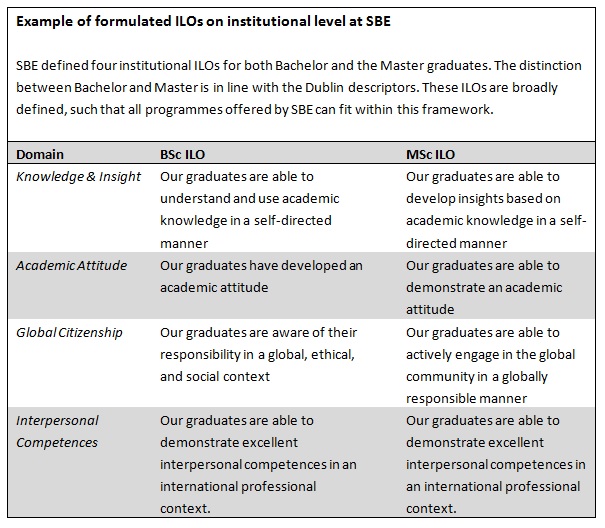Intended Learning Outcomes on institutional level
At an institutional level, ILOs can be formulated in the line of the 21st century skills, like creativity or life-long-learning. Often you would find that these ILOs are not translated into specific teaching activities and/or assessments methods, but these are related to the overarching educational philosophy (i.e. PBL). At the programme level, the ILOs become more concrete and more related to the content or profession.
Formulating ILOs on institutional level
At Maastricht University, we perceive the institutional level as both the level of Maastricht University as well as the Faculty level. We include the Faculty level at this institutional level, since each UM Faculty can put its own emphasis within the framework of Maastricht University. This Faculty level is different from the programme level as it concerns rather generic attributes and covers the whole range of programmes within that Faculty.
Institutional ILOs thus can consist of attributes set by the University institution as well as attributes set by the Faculty. These are ILOs at an institutional level, meaning that they are not targeting a specific field of study. They are relevant to the broad range of all University and/or Faculty graduates, and can be seen as the context within which a programme is embedded. Typically, the institutional ILOs consist of generic skills each graduate is expected to develop. These ILOs can be rather abstract and don’t necessarily need to be formulated as a measurable ILO. The translation into measurable (SMART) ILOs takes place at the course level (see next tab).

Explanation of the domains
- Knowledge & Insight
These learning goals focus on the cognitive domain (as described by Bloom), which involves the development of knowledge. There are multiple categories of cognitive processes, such as understanding, applying, analysing, evaluating, and creating (starting from the simplest to the most complex). Keep in mind that the categories build on each other (e.g. you need to understand a concept before you can apply it). It is therefore important that students learn to handle topics at different stages of the taxonomy for optimal learning effects. - Academic Attitude
Academic attitude refers to intellectual skills a student needs to function in an academic or professional environment, such as: critical thinking, self-directedness, awareness of the limitations of data and theories, and reflectiveness. These are all mechanisms that allow students to make meaning out of their experiences and adjust their frames of reference.
- Global Citizenship
Fostering global citizenship is at the heart of higher education in the 21st century. Students are presented with the opportunities to nurture the mindset and abilities required to operate in an increasingly interconnected global society. These include social responsibility, global awareness and societal engagement. Our graduates are able to think beyond the boundaries of their discipline about the context in which they function, and the consequences of actions or decisions. - Interpersonal competences
Interpersonal competences are work-supporting skills which are of vital importance for learning, but also for the future careers of our students. The classic examples of interpersonal competences are writing skills, presenting, and teamwork. In the PBL environment, students have to work extensively with others in small groups, so they have plenty of opportunity to practice those skills and to use them to improve their learning experience.
